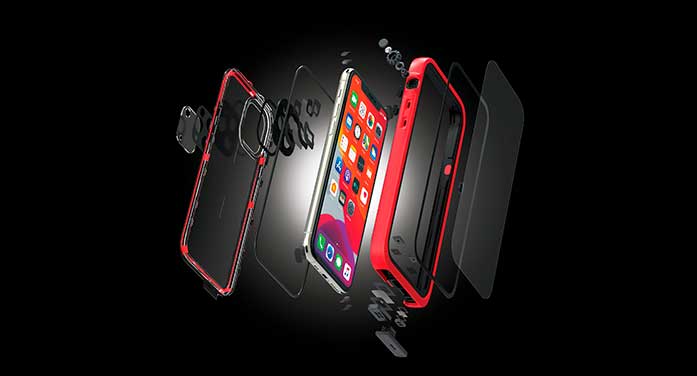
Having a case on your phone, giving you wipeable surfaces, is certainly a step in the right direction. But …
 We’re all trying to be better informed and protect ourselves and loved ones by reducing exposure to COVID-19 and its variants. We’re social distancing, wearing masks and constantly sanitizing and washing our hands. But how many of us think of our smartphone as a major source of threat to our health?
We’re all trying to be better informed and protect ourselves and loved ones by reducing exposure to COVID-19 and its variants. We’re social distancing, wearing masks and constantly sanitizing and washing our hands. But how many of us think of our smartphone as a major source of threat to our health?
We’re attached to our phones almost constantly, even more than before the ongoing lockdowns and isolation.
But these wonderous mobile devices have also been called petri dishes carrying more germs than toilet seats. And that can include the dreaded COVID-19 virus.
According to an independent DScout study, the average person touches their phone over 2,600 times per day.
“They’re a breeding ground for germs, viruses and bacteria. And since we use our devices every day, we touch them, we touch our faces, we usually don’t think about it,” says June Lai, scientist and co-founder and CEO of Catalyst Lifestyle Ltd.
Depending on the model, you may be able to wash your phone. Lai suggests disinfecting hard surfaces following guidelines from the U.S. Centers for Disease Control and Prevention. She alternately recommends using a disinfectant of 70 percent isopropyl alcohol or 70 percent ethanol, which is “proven to protect from 22 types of coronaviruses.”
Certain iPhone models are also submersible. However, Apple cautions about submerging your device in any cleaning agents or allowing moisture to enter any openings.
Cleaning agents can also scratch surfaces, destroy valuable coatings like the oleophobic (oil repelling) coating on an iPhone display and seep into your phone’s ports. Even simple soap residue can ruin connectivity and reduce the lifespan of your device.
Having a case on your phone, giving you wipeable surfaces, is certainly a step in the right direction. But some cases aren’t 100 percent waterproof, allowing leaks through weak seals.
Lai adds that using cleaners like bleach (which needs to stay on surfaces longer to be effective) can lead to discolouration and can lead to material deterioration and affect its integrity.
Unless you have the right case.
Catalyst is a high-tech accessories maker founded to protect iPhones. The company has a series of waterproof cases that protect your phone from drops up to two metres (military-standard) and from damage from various types of liquids and disinfectants. The cases can withstand repeated washings and can be cleaned with soap and water as well as approved disinfectants, including alcohol.
The cases are precision-engineered and rigorously tested to be fully sealed to prevent water, snow, dirt and sand from getting into your device. They’re also submersible in water down to a depth of 10 metres while leaving access to all your phone’s ports.
The Catalyst cases are slim and attractive – the iPhone 12 model is only 1.4 cm thick. The front and back are clear so you can see the colour of your phone. They use patented technology that allows the phone audio to be crystal clear. There’s also a built-in optical lens that allows you to shoot great photos and videos without removing the case.
Catalyst’s iPhone 11 case has 46 component parts that are put through rigorous tests, such as waterproof tolerances down to 0.05 mm. It also has practical features like a rotating mute switch and a glove-friendly button. It also allows the phone to be charged without a cable.
All this helps you operate your phone like the case isn’t there while protecting it and reducing your risk of infection when properly implemented into your daily protection routine.
Lai suggests you use the same procedure for disinfecting your phone and case as you would for yourself.
You can find a selection of Catalyst waterproof cases for various devices at CatalystCase.ca, Amazon.ca, Apple and many other retailers.
If you want to learn more on this topic, along with expert advice, a scientific view and suggestions on proper COVID-19 phone safety etiquette, check out our Toastcaster Podcast interview with June Lai. Originally from Vancouver, Lai is now based in Hong Kong, where she also oversees research and development at the company.
Greg Gazin, also known as the Gadget Guy and Gadget Greg, is a syndicated veteran tech columnist, communication, leadership and technology speaker, facilitator, blogger, podcaster and author. Reach him @gadgetgreg or at GadgetGuy.ca.
The views, opinions and positions expressed by columnists and contributors are the authors’ alone. They do not inherently or expressly reflect the views, opinions and/or positions of our publication.

